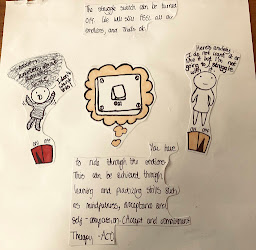When we feel a difficult emotion, it normally triggers our struggle switch to turn ON. Say for example you feel anxious about something. If you start panicking about knowing you're feeling anxious, it can cause a ripple effect of even more emotions to enter your mind. You may feel sad or angry that you're feeling anxious, and then annoyed at yourself because 'you shouldn't feel anxious', and then sad. Trying to battle with all of these emotions at once only perpetuates the anxiety. I'll give you an example. I've struggle with meal portions . Something i've always found hard but with lockdown it's become harder for whatever reason. After a dietician appointment and weigh in came a reality check. For the past week I've been increasing meal portions. ( i know this may sound a bit bizarre but i cannot explain how terrifying this is, and i've always avoided it just for 'short term relief'. It causes huge anxiety. When i'm feeling anxious about it i then have a mental battle going on and thoughts such as 'this is too much, i'm not going to be able
to tolerate is, i'm out of control, i don't want to feel guilty, why can't i do this, why am i a failure'.....blah blah blah. You can see how one thought/feeling can snowball into lots more,. All that ends up happening is you end up feeling worse. So clearly it's not worth giving the thought too much attention??
This is where turning the 'struggle switch OFF' comes in. It's natural to feel difficult emotions. We all do. It's normal. Without the bad, we wouldn't feel the good. The arguement is, when anxiety comes in, it's about accepting this is happening, but not giving it too much thought. It's easier said then done. But it's about trying to be present in the moment to distract yourself from the thought. It's not about avoidance as you're accepting this is how you're feeling, but moving on. Emotions come and go. It's impossible for the anxiety to stay forever. Anxiety only ever peaks and then comes down. So with the food example practising this would be to think 'I feel anxious, but I knew i would, so this is no suprise.' And then trying to focus on something else. Anything; what's around you, the conversation with someone else you may be having, what you're doing tomorrow, Just anything other than getting anxious about the fact you're anxious.
It seems such a simple concept but it takes practice. If your brain is used to reacting a certain way when dealing with emotions, you have to create a new neural pathway. The more you practice, the more you're brain will start thinking 'this is the new way of dealing with this emotion'.






